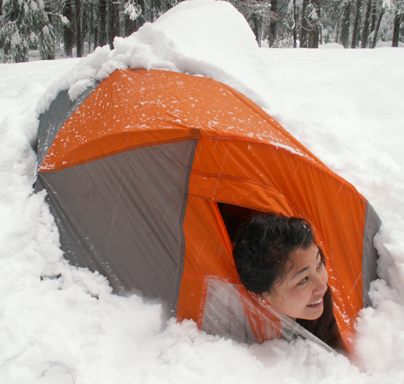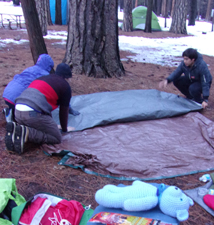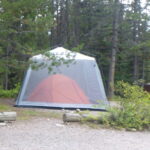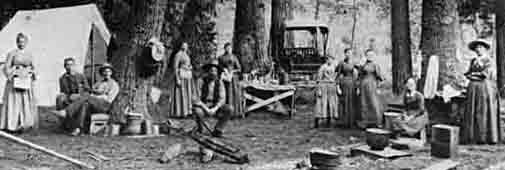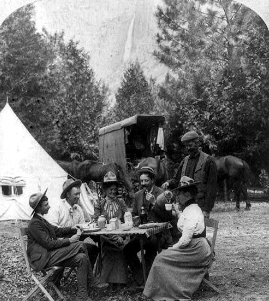This page has tips for and answers typical questions from first-time women campers.
a NPS photo of girls camping in 1932:
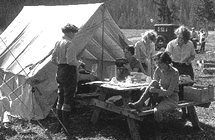
How do I wash my hair?
On short trips, many ladies don’t, they just wear bandannas, braids or otherwise tie back their hair.
For summer trips:
Restrooms in most public campgrounds don’t have hot water. And most public campgrounds don’t have showers. (Those that do require you feed in a lot of quarters, or buy tokens to feed into the shower.)
When in a campground, you can heat some water over a stove
or you can fill a few gallon bottles with water in the morning and set them in the sun all day. Then in the afternoon they might be lukewarm or will be at least be not too cold and you can lean over a restroom sink, pour them over your head, maybe put on a little more shampoo than you might use at home and wash/rinse your hair. For long hair you might want four or five gallons.
You can then refill the bottles and use the same ones for putting out the campfire that evening.
Don’t pour soapy water on the ground, or wash hair at water faucets outside. No matter how biodegradable or ‘natural’ your brand of soap is, never use it in or near a lake, stream, river, etc.
Every make/model of biodegradable soap pollutes.
In Yosemite we put reflective covers over the campsite food storage locker (to keep down the heat inside and save on ice costs) and set the water bottles on top to warm up.
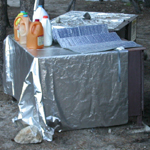
___________________________________________
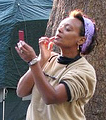 Most women camping and backpacking don’t wear much makeup, just sunscreen,
Most women camping and backpacking don’t wear much makeup, just sunscreen,
(15 SPF is not strong enough), chapstick or chapstick with sunscreen,
and dry skin lotion (pack maybe more than one small bottle, but if you put one in your daypack for a hike, be sure to remove it before bedtime so you won’t attract animals to your tent),
and maybe a little waterproof/sweatproof mascara.
Remember that any even slightly perfumed product will attract mosquitoes. This includes clothes that have been rinsed or dried with scented softeners. (Dryer sheets also can make a greasy stain on clothes if they get stuck to them, and the softeners can decrease the lofting and wicking of garments.)
Your fingernails may have more wear, so a real, sturdy (metal?) ‘sapphire’ type nail file will be better than a paper emory board.
Real nail clippers work for nails; scissors don’t.
You need not-cheap sunglasses, wide enough to really help, with UV protection, and a hat with a wide brim.
You will need real rain gear, a jacket and pants, or you might end up dressing in plastic leaf bags:
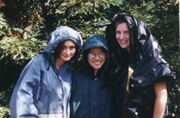
Please don’t bring thin, easily torn temporary rain gear like they sell at airports for emergencies. Snow or rain camp must-haves has details about how to dress to be warm and dry, and applies to camping when you just didn’t expect really cold or wet weather but you got it anyway.
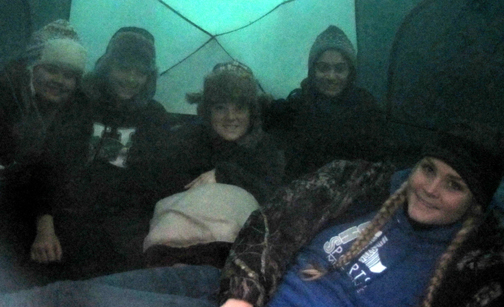
___________________________________________
___________________________________________
lots of girls of all ages camp with a favorite stuffed animal:
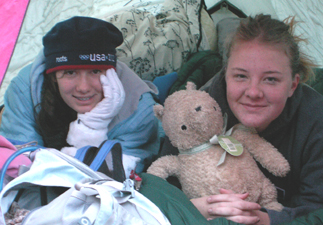
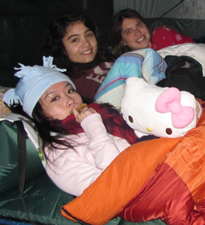
Many people sleep better with their favorite pillow from home than with a jacket wadded up under their head. Some of us pack a pillowcase to stuff that jacket or some spare clothes into.
___________________________________________
____________________________________________________________
There are no restrooms, privies or outhouses along most trails in the wilderness, or even close in to many developed areas in parks.
During any hike or backpack,
To truly be able to leave no trace and follow backcountry rules about camping the proper distance from a lake or digging your personal latrine hole the proper distance from water, etc., you will need to know how far 100 or 200 feet is. Lay out a tape measure at home and walk it and count your paces.
How to poop in the woods
__________________________________________________________________
___________________________________________
The precautions about bears below mention using pre-moistened, unscented cleaning towelettes.
These are useful regularly to freshen up. Brands include Pampers Natural Aloe Touch or Target housebrand soft cloth baby wipes. Choose unscented. Choose a kind without diaper rash ointment.
Put a few in a zip-lock bag in your pocket or day pack. You might want to write a “do not flush” reminder on the bag.
___________________________________________
Can menstruating women camp or backpack around bears?
Yes!
Black bears are the kind we find on our California trips, for example to Yosemite and Lake Tahoe, and they do not tend to attack anyone unless threatened or a mom defending her cubs. Grizzlies live in the Rocky Mountains, not in California. Grizzlies have rarely attacked people. You can camp where either kind live.
In the webpage, Bears and Menstruating Women, at the Yellowstone National Park website
https://www.nps.gov/yell/learn/nature/grizzlybear-menstrual-odor.htm
In 2017 it says:
“Are grizzly bears overly attracted to menstrual odors?
The question whether menstruating women attract bears has not been completely answered. While there is no evidence that grizzly bears are overly attracted to menstrual odors more than any other odor and there is no statistical evidence that known bear attacks have been related to menstruation, certain precautions should be taken to reduce the risks of attack. The following precautions are recommended:
Use pre-moistened, unscented cleaning towelettes.
Use internal tampons instead of external pads. Do not bury tampons or pads (pack it in – pack it out). A bear may smell buried tampons or pads and dig them up. By providing bears a small food “reward,” this action may attract bears to other menstruating women.
Place all used tampons, pads, and towelettes in double zip-loc baggies and store them unavailable to bears, just as you would store food. All odorous items that may attract bears, including food, cooking and food storage gear, toiletries, and garbage, must be kept secured from bears.
Proper methods for storing bear attractants include:
1.) in a vehicle (the trunk of a car or cab of a truck),”
(please note–these precautions are for Yellowstone, (2011 and 2017 website), where the bears had not yet learned to break in to cars. DO NOT store food, etc. in cars in Yosemite!!)
” 2.) in a solid camping trailer that is constructed of non-pliable material (never in a tent or tent trailer),”
(preferably with windows rolled up)
“3.) in a food storage box (provided at some campgrounds),”
(On most of our college sponsored trips there is either a bear box food storage bin at the backcountry campsite, or we bring Garcia canisters.)
4) . . . I am not quoting out-dated advice to hang food / trash, as it is not effective enough at keeping animals from it. Many parks no longer allow hanging food. And I am not quoting some advice about possibly burning trash.
(We don’t allow people to burn trash on our trips, orange peels, apple cores, feminine products, toilet paper . . . pack it all out.)
” Many feminine products are heavily scented. Use only unscented or lightly scented items. Cosmetics, perfumes, and deodorants may act as an attractant to bears.”
Previously (2011) they also said:
” Rogers et al. (1991) recorded the responses of 26 free-ranging black bears (Ursus americanus) to used tampons from 26 women and the responses of 20 free ranging black bears to four menstruating women at different days of their flow. Menstrual odors were essentially ignored by black bears of all sex and age classes. In an extensive review of black bear attacks across North America, no instances of black bears attacking or being attracted to menstruating women was found (Cramond 1981, Herrero 1985, Rogers et al. 1991). . .”
“. . .The question whether menstruating women attract bears has not been completely answered (Byrd 1988). There is no evidence that grizzlies are overly attracted to menstrual odors more than any other odor and there is no statistical evidence that known bear attacks have been related to menstruation (Byrd 1988). However, park visitors have been injured and killed by bears (Gunther and Hoekstra 1996). If you are uncomfortable hiking and camping in bear country for any reason, you should probably choose another area for your recreational activities.”
The Glacier National Park Backcountry Planner said: “Stay clean, but avoid scented soaps, deodorants and cosmetics… Many women fill a heavy duty Ziploc bag with some baking soda, put used feminine products inside, and then put that bag inside one or two more heavy duty Ziploc bags. Never keep this bag inside your tent and always” (store it) “with food, garbage and other scented items” (which on our trips will be a Garcia canister or the campsite food storage box).
___________________________________________
Information on how Yosemite bears break into cars, what to do if you see a bear and more is at: Bears
your safety in grizzly bear territory tells you what to do if you see a bear in the distance or a bear charges you and has info about Bear Pepper Sprays and what might happen before a bison charges.
___________________________________________
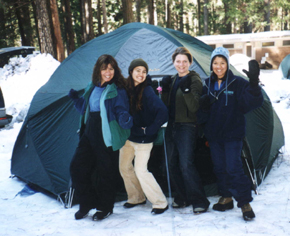
At Have more fun camping you can learn how to build campfires that don’t smoke too much,
how to pack an ice chest (cooler), do dishes in camp and lots more.
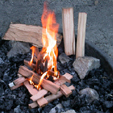
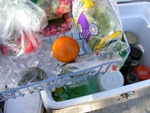
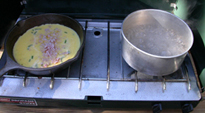
Not all campgrounds have drinkable water, so check in advance and bring a water purifying pump.
Get your vehicle checked for driveability and do those repairs. There is no excuse for neglected preventive maintenance or a vehicle owner who is willing to drive on a trip when s/he suspects car trouble. Change all the fluids, check and replace as needed all the major components that power, cool, light and stop your vehicle.
___________________________________________
Enhance a hike by reading:
The day hike gear section at Camping equipment checklist
During a thunderstorm, don’t take a shower or use a sink, including washing dishes. Don’t talk on a land line phone. Don’t use your I pod. Don’t get zapped! Please read Thunderstorm and lightning safety It includes the answer to the question: Why can’t you swim during a lightning storm? A strike on a lake doesn’t kill all the fish in the lake.
At altitude you will probably feel out of breath at first and may even get a headache and lose appetite. You can get more sunburned. Your tent mate might seem to stop breathing.
Backpacking Advice has these sections: Must bring for each large group (or perhaps for each couple or person), Must bring backpacking for each person, Some (crazy?) people think these are optional for backpacking, Backpacking luxuries(?), Do not bring these backpacking, To keep down on weight backpacking, Don’t rush out and buy, BACKBACKING FOOD, Low-cook backpacking foods, Yosemite National Park WILDERNESS PERMITS and Half Dome hike advice, ‘Leave No Trace’ camping has these basic principles.
see also: Cell phones in the wilderness which has advice on how/when to use a cell phone to contact 911 in the wilderness and a warning about interference between cell phones, iPods and avalanche beacons.
 You can’t always expect a helicopter rescue
You can’t always expect a helicopter rescue
Can a person who is prescribed an epi-pen risk going into the wilderness? and some sting prevention notes are at: Anaphylaxis quick facts
insect repellant has answers to questions about the percentage of DEET needed in an effective insect repellant, toxicity allergies, and more.
If you expect lots of mosquitos you could pitch your tent IN a screenroom:
Hiking Advice has hot weather hiking advice, hiking logistics and the answer to the question: When is the best time of day to cross a mountain stream?
Enhance your drive to the park: Road trip advice and etiquette
Swimming in Yosemite National Park
Leave no trace If going into the wilderness, choose hiking, backpacking, and camping gear and clothing that are natural earth tone colors like green, brown, tan. (Some websites also recommend black, but it, along with flowery prints and bright colored clothing, attract insects that sting.) Bright colors like white, purple, blue, red and yellow do not blend in with the environment, can be seen from miles away and contribute to a crowded feeling. But do carry at least one item of very visible clothing and/or gear to help rescuers find you if needed.
Camping in Yosemite in 1890:
Camping in Yosemite in 1902:
Camping in Yosemite in 2008:
